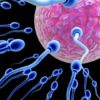Men may not have been dealt an equal hand when it comes to immunity. Dr. Maya Saleh, of the Research Institute of the McGill University Health Centre, reports in a new study that women have a more powerful immune system than men. In fact, the production of estrogen by females could have a beneficial effect […]






